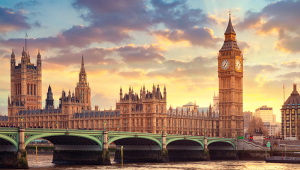
Image © Ink Drop/Shutterstock
Writing in “Winds of Change”, his analysis of the MacMillan years, Peter Hennessy quotes Sir Richard Turnbull - the last but one governor of Aden - saying that when the British empire finally sank beneath the waves, it would leave just two monuments: association football and the expression “f*** off”.
Despite the drawn-out dismantling of Empire, the four decade long embrace and subsequent rejection of Europe as the replacement post-imperial role, Britain’s domestic life, its art, culture and education has transformed and thrived through all the vicissitudes of economic and political change. Society is far more diverse, and far less deferential to authority.
Indeed, the bastions of the establishment have on many occasions revealed feet of clay, yet in the main the nation retains an atavistic preference for tradition and institutions regardless – as we will see in the coronation.
Devolution is forcing a national discussion about how power is vested and distributed in what remains the most over-centralised system of governance in the western world. With the focus stuck on the trailblazers of Greater Manchester after their long march from the rubble of IRA bombings to devolution exemplars, as well as Andy Street in the West Midlands, we see potentially a new paradigm for regional economic government built on an informally reformed model of central and local relations.
In short, sub-regional offices for the regions in all but name and with cross departmental support to deliver on place-based outcomes. It also suggests, and the North-East Lincolnshire levelling up deep dive that resulted from its pioneering town deal, that where there’s a will there’s a way.
But the asymmetric nature of devolution in other parts of the country let alone with the devolved administrations, and the lack of enthusiasm for mayoral models in the greater south-east and south west suggests that better relationship building might point the way than rigid devolution frameworks.
We have to accelerate the process so all parts of the compass can benefit from local control over public service reform, economic, transport and social and physical infrastructure.
To prepare for this, Whitehall will have to be re-energised and repurposed to support place prosperity. This will require a mindset change in how our localities our served and for whose benefit and the dynamics of the relationship between central and local.
Perhaps energised by the AI revolution, a burst of pragmatic but far reaching reform, and without another waffly commission or latter day Fulton report – and perhaps not too dissimilar from the establishment of Next Steps Agency model of slimmed down and entrepreneurial minded and agile central government activity - would address the strange mixture of profligate spending on one hand and parsimony on the other that results in billions being spent on central silos with little to ultimately show for it.
Who knows, as a nation we might leave more of a mark on the world than that of football and profanity.
Read more in State of the Nation in the current edition of Public Finance











